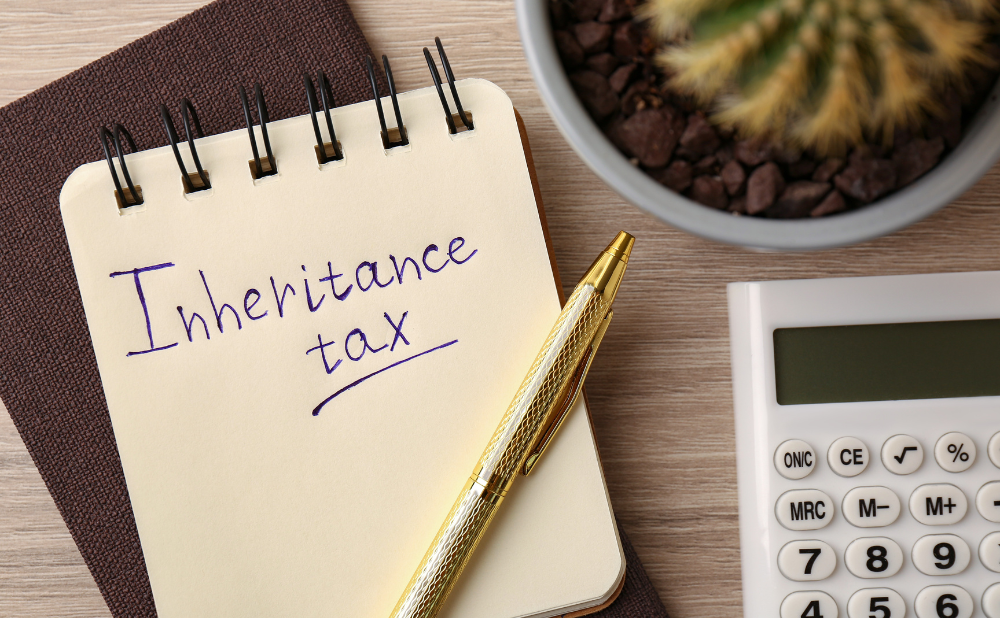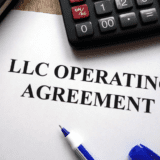Death and taxes are often called life’s only certainties. When someone passes away, dealing with taxes can add to an already challenging time. Gaining clarity on the process may help reduce confusion. The Pennsylvania Inheritance Tax can involve several steps, especially when settling an estate. This overview highlights what to expect during estate planning and how the tax may apply.
Many families are unsure where to start with the Pennsylvania Inheritance Tax. Taking time to learn the basics is an important first step.
Disclaimer: This article is for educational and informational purposes only. It does not constitute legal or tax advice. Laws and regulations regarding inheritance tax and estate planning vary by jurisdiction and can change over time. Readers should consult a qualified attorney or tax professional to discuss their specific situation. For legal guidance tailored to Pennsylvania estate matters, consider speaking with an attorney at Bumbaugh | George | Prather | DeDiana.
Understanding the Pennsylvania Inheritance Tax
The Pennsylvania Inheritance Tax is a state-level tax imposed on the transfer of property from a deceased person to their heirs. It applies whether the assets are distributed through a will, trust, or under Pennsylvania’s intestacy laws when no will exists.
Rather than taxing the estate itself, the Pennsylvania Inheritance Tax is levied on the beneficiaries. It is based on the value of what each individual receives and their relationship to the deceased. This tax is a key consideration in Pennsylvania estate planning and may influence how assets are distributed.
Understanding how the tax works can help families make informed decisions during what is often a difficult time.
Who Pays Inheritance Tax in PA?
Whether or not someone pays the Pennsylvania Inheritance Tax typically depends on their legal relationship to the person who passed away. The state assigns different tax rates to different classes of beneficiaries.
Here is a general breakdown of how the tax may apply:
- Spouses: Property transferred to a surviving spouse is taxed at a rate of 0%. This includes assets jointly owned by both spouses.
- Lineal Heirs: Children, grandchildren, stepchildren, and parents of the deceased are taxed at a rate of 4.5%.
- Siblings: Brothers and sisters of the decedent are taxed at a 12% rate.
- Other Beneficiaries: Nieces, nephews, cousins, friends, and unrelated individuals are taxed at a rate of 15%.
- Charitable Organizations and Government Entities: Transfers to qualified charitable organizations, religious institutions, and government agencies are generally exempt from the tax.
Correctly identifying each heir’s relationship to the deceased is essential. This can help ensure that the applicable rate is used and any valid exemptions are properly applied.
What’s Taxable?
Most property owned by the deceased at the time of death may be subject to Pennsylvania Inheritance Tax. This typically includes both tangible and intangible assets.
Here are some examples of assets that may be taxed:
- Real estate located in Pennsylvania
- Bank accounts, including savings, checking, and CDs
- Stocks, bonds, and other investment accounts
- Vehicles and boats
- Personal property, such as jewelry, collectibles, furniture, and household goods
- Certain retirement accounts and business interests
Jointly owned property may also be taxed, although there are exceptions when the joint owner is a surviving spouse. In these cases, the entire value of the property may not always be subject to the tax, depending on how it was titled and contributed to.
Importantly, life insurance proceeds that are paid directly to a named beneficiary are exempt from the Pennsylvania Inheritance Tax. This is often misunderstood, as some people assume all insurance payouts are taxable.
In general, most assets of value transferred from an estate may fall within the scope of the Pennsylvania Inheritance Tax. Each case may vary, so consulting with a professional familiar with Pennsylvania estate laws can help clarify what applies in your situation.
Tax Rate and Payment Details for Pennsylvania Inheritance
Knowing the tax rate is important. Understanding payments and deadlines is something else. Dealing with taxes can be confusing. It is important to seek support when needed.
Payment Deadlines and Discounts
Inheritance tax payments are due at the time of the decedent’s death and become delinquent nine months later. If the tax is paid within three months of the date of death, a 5% discount is applied to the amount due.
Filing and Payment Procedures
For Pennsylvania residents, inheritance tax returns and payments should be submitted to the Register of Wills in the county where the decedent resided. Payments can be made by check or money order, payable to “Register of Wills, Agent.”
Non-resident inheritance tax payments should be directed to the Pennsylvania Department of Revenue at the following address:
PA Department of Revenue
Bureau of Individual Taxes
Inheritance & Realty Transfer Tax Division
PO BOX 280601
Harrisburg, PA 17128-0601 Penn
It’s important to adhere to these procedures to ensure timely and accurate payment of the Pennsylvania Inheritance Tax.
Understanding Exemptions
Not all assets are subject to the Pennsylvania Inheritance Tax. The state allows specific exemptions that may reduce the overall tax burden for certain beneficiaries. These exemptions depend on the nature of the asset and the relationship between the deceased and the recipient.
A common exemption involves property transferred between spouses. If a married couple owns property jointly, that property is typically exempt from Pennsylvania Inheritance Tax when one spouse passes away. This exemption helps ease the financial impact on the surviving spouse.
Other exemptions recognized under Pennsylvania law include:
- Spousal Transfers: Property passed to a surviving spouse is not taxed.
- Transfers from Minor Children: Assets transferred from a child age 21 or younger to a parent are exempt.
- Qualified Agricultural Property: Certain farmland or agricultural assets transferred to children, grandchildren, or siblings may be exempt if the death occurred after June 30, 2012. The property must meet specific use and ownership criteria.
- Military Exemption: For deaths occurring on or after September 6, 2022, personal property transferred from the estate of a military member who died from an injury or illness incurred during active duty, in the reserves, or in the National Guard is exempt from Pennsylvania Inheritance Tax.
In addition to these specific categories, there may be other exemptions or planning strategies available depending on the estate’s size, composition, and beneficiaries. Some trusts, retirement accounts, and life insurance payouts may also be treated differently for tax purposes.
Because exemptions can affect how much tax is owed and which forms must be filed, it is important to ensure each asset is classified properly. Speaking with an estate planning attorney or tax professional may help you better understand how Pennsylvania’s inheritance tax rules apply to your situation.
Navigating Pennsylvania Inheritance Tax Returns
Informational only — not tax or legal advice. Please consult a qualified professional for guidance.
Administering a Pennsylvania estate often involves filing an Inheritance Tax Return. While it may seem intimidating, understanding each step can make the process more manageable. The return plays a critical role in ensuring compliance with state law and determining the correct amount of tax due.
Accurate filing helps facilitate the legal transfer of estate assets to beneficiaries and can help avoid penalties, interest, or processing delays. Executors, administrators, or other estate representatives are typically responsible for submitting this return.
If you’re unsure about any part of the process, consider consulting a licensed attorney or tax advisor familiar with Pennsylvania inheritance tax laws. This content is provided for general information only and should not be taken as legal or tax advice.
Step-by-Step Filing Process for Inheritance Tax Return
So how does someone even start filing an inheritance tax return? What steps are involved? This process can seem overwhelming.
Here’s a general overview of the filing process:
- Locate the Will (if available)
Begin by securing a copy of the deceased’s will. If there is no will, Pennsylvania intestacy laws will determine how the estate is distributed. - Gather Financial Documents
Collect records of all the decedent’s assets, including bank accounts, investment holdings, real estate, retirement accounts, and personal property. Use date-of-death values to establish fair market estimates. - Identify Eligible Deductions
Certain expenses may reduce the taxable estate value. These often include funeral costs, debts owed by the decedent, legal fees, and administrative costs tied to managing the estate. - Complete Form REV-1500
This is the official Pennsylvania Inheritance Tax Return. The form is available through the Pennsylvania Department of Revenue. Each section must be filled out carefully. Supporting documentation is usually required. - Submit the Return
Mail two copies of the completed REV-1500 to the Register of Wills in the county where the deceased resided. Payment should be made to “Register of Wills, Agent.” The return must generally be filed within nine months of the date of death. Early payment may qualify for a small discount.
Remember, professional advice can make the whole tax return filing easier. This helps those submitting feel less stressed through it. Bumbaugh | George | Prather | DeDiana offers guidance through the filing process.
Consider seeking help from qualified legal counsel. This helps to avoid errors and ensures compliance.
Deductions and Expenses That Can Reduce the Inheritance Tax
Some costs may be deducted from the estate’s value before calculating the Pennsylvania Inheritance Tax. While each situation is different, common deductible expenses include:
- Funeral and burial costs
- Outstanding personal debts
- Legal, accounting, or appraisal fees
- Costs related to estate administration (e.g., executor commissions)
Additionally, the Family Exemption may apply. This allows a qualifying family member who resided with the deceased to exclude a portion of inherited property from taxation. Eligibility depends on factors such as the nature of the relationship and living arrangements at the time of death.
Estate Planning Strategies and Pennsylvania Inheritance Tax
Effective estate planning may help reduce the inheritance tax burden for beneficiaries in Pennsylvania. With thoughtful preparation, some families can preserve more of their assets across generations.
While there are various approaches to consider, it’s important to evaluate each option carefully. An estate planning attorney can explain which strategies may apply to your unique situation. The team at Bumbaugh | George | Prather | DeDiana assists individuals and families with Pennsylvania-based planning concerns.
Irrevocable Trusts and Beneficiaries in Pennsylvania
An irrevocable trust is one estate planning tool that may offer long-term protection for assets. Once established, the trust’s terms cannot be changed easily, but it may provide peace of mind for those looking to preserve wealth for children or grandchildren.
How an irrevocable trust may help:
- Assets placed in the trust are typically not counted toward inheritance tax after the grantor’s death.
- The trust can be tailored to provide funds for specific needs such as education, housing, or medical care.
- These assets are no longer considered part of the grantor’s estate, which may reduce the overall tax burden.
Irrevocable trusts are complex and require legal oversight. Discuss your goals with an attorney who can help you structure the trust according to Pennsylvania laws.
Lifetime Gifting and Inheritance Tax Implications
Gifting during your lifetime may be another way to manage future tax exposure. By gradually transferring assets to loved ones, some families reduce what remains taxable in their estate.
That said, Pennsylvania may include certain gifts in the inheritance tax calculation. Any gift exceeding $3,000 to a single person within one year of your death may be counted back into the estate. This rule is often overlooked.
To make the most of gifting strategies:
- Document all significant gifts.
- Track dates and amounts carefully.
- Consider smaller annual gifts to multiple beneficiaries.
Before making large transfers, consult a professional to avoid triggering unintended tax consequences.
Joint Ownership and Pennsylvania Inheritance Tax
Many families hold property in joint ownership, but this setup may still carry tax implications in Pennsylvania. While property held jointly between spouses is generally exempt, other forms of joint ownership are treated differently.
If the property is jointly owned with someone other than a spouse, only the decedent’s portion is taxed. This portion is typically calculated based on the number of owners and each person’s contribution to the purchase of the asset.
Why titling matters:
- Properly titled property may reduce taxable estate value.
- Misunderstanding joint ownership rules can lead to unexpected tax bills.
- Legal guidance helps align ownership methods with your broader estate planning strategy.
For clarification, work with an estate attorney familiar with Pennsylvania inheritance law. They can help assess your property setup and suggest possible improvements.
Seeking Legal Advice for Pennsylvania Inheritance Tax Matters
Understanding Pennsylvania’s inheritance tax laws can be challenging. The regulations, deadlines, and exemptions involved are often difficult to navigate without legal insight. Working with an attorney experienced in estate matters may reduce confusion and help ensure filings are handled properly.
Legal guidance can support estate representatives by clarifying responsibilities, preparing documentation, and helping avoid common missteps. For those managing high-value estates or complex family arrangements, having legal support can make the process more manageable.
When to Consult an Estate Planning Attorney about Pennsylvania Inheritance Tax
While every estate is different, it may be helpful to speak with an estate attorney in the following situations:
- You are managing a large or complicated estate involving multiple beneficiaries, trusts, or business interests
- You are preparing estate planning documents and want to align them with Pennsylvania inheritance tax rules
- You are facing disagreements or potential disputes among heirs or creditors
- You need help understanding how state-specific inheritance tax laws apply to your property
The attorneys at Bumbaugh | George | Prather | DeDiana have experience guiding families and individuals through these challenges. We encourage you to reach out to discuss your options.
Why Legal Support Matters in Inheritance Tax Planning
Trying to handle inheritance tax matters alone can be overwhelming. Engaging with an estate planning attorney can help you:
- Understand Pennsylvania inheritance tax law and how it applies to your unique situation
- Ensure documents such as the REV-1500 form are completed correctly and submitted on time
- Identify and apply exemptions or deductions that may reduce tax liability
- Minimize potential conflicts by creating a clear and legally sound distribution plan
- Receive reliable guidance that supports your financial and legal goals
Estate planning and inheritance tax compliance require careful attention to detail. Legal professionals can help ensure your filings are accurate, timely, and structured to meet Pennsylvania law.
Bumbaugh | George | Prather | DeDiana: Trusted Support for Inheritance Tax Guidance
If you are seeking thoughtful, local guidance on inheritance tax matters in Pennsylvania, the attorneys at Bumbaugh | George | Prather | DeDiana are here to help. We assist clients with estate planning, tax return filings, probate issues, and trust administration.
With decades of combined legal experience, our team provides clear, compassionate support during what is often a difficult time. We serve clients throughout Westmoreland County and Southwestern PA. For a consultation, contact us at (724) 864-6840 or info@bumbaughgeorge.com.
Final Thoughts on the Pennsylvania Inheritance Tax
Dealing with the Pennsylvania Inheritance Tax can feel overwhelming, especially during a time of grief. From determining who pays and what is taxable, to identifying exemptions, filing deadlines, and strategic planning, there are many moving parts to consider.
Taking time to understand the basics of Pennsylvania Inheritance Tax is a valuable step toward effective estate administration. However, every estate is different, and state rules can be complex. Working with knowledgeable legal counsel may help you avoid costly errors and ensure the estate is managed in line with Pennsylvania law.
Whether you are settling a loved one’s estate or planning your own legacy, the attorneys at Bumbaugh | George | Prather | DeDiana are available to guide you through each stage of the process with clarity and care.
FAQs about Pennsylvania Inheritance Tax
How much tax do you pay on inheritance in PA?
The Pennsylvania inheritance tax rate varies based on your relationship to the person who passed away:
- 0%for transfers to a surviving spouse
- 4.5% for lineal heirs such as children, grandchildren, and parents
- 12%for siblings
- 15%for other beneficiaries, including extended family, friends, and unrelated individuals
Rates apply to the value of the assets received and are calculated separately for each beneficiary.
How do I avoid inheritance tax in PA?
Avoiding Pennsylvania inheritance tax completely is difficult. Estate planning strategies, such as using irrevocable trusts, gifting strategies, and carefully managing joint ownership, can reduce the tax burden. Engaging with the right Pennsylvania estate planning attorney can mitigate the tax burden.
What is the family exemption for inheritance tax in PA?
The family exemption is a deduction that certain family members can claim. A qualifying family member shares a home with the deceased. The Pennsylvania Department of Revenue has information on current guidelines for up-to-date exemption amounts and eligibility. Make sure to check current guidelines for up-to-date exemption amounts and eligibility. It is an important part of filing your tax return.
What are the rules for inheritance in PA?
Inheritance rules in PA are based on the relationship to the deceased and the type of property transferred. Certain assets, like life insurance proceeds and jointly owned property between spouses, are often exempt. Knowing the Pennsylvania inheritance tax rules can help to make informed decisions.







